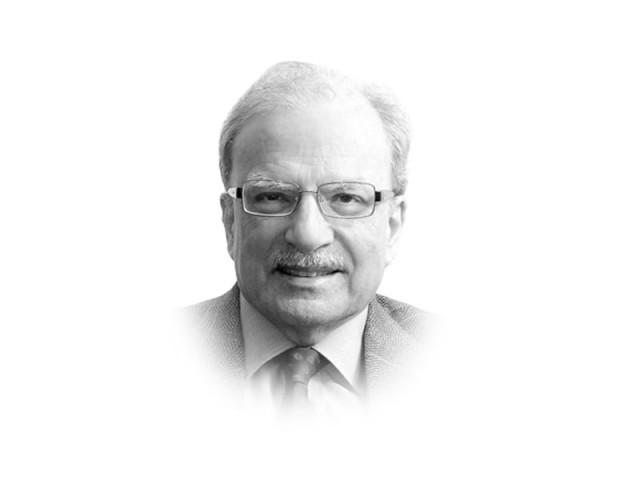Dealing with an uncertain environment
Pakistan’s policy towards the world must factor in changing interests outside of our usual ‘India-centric’ approach

The writer is a former caretaker finance minister and served as vice-president at the World Bank
The policy towards the world must factor in the changing interests besides India and take into account the US, China, Saudi Arabia, Iran and various Islamic movements. Accommodating these players needs nimbleness that will take a great deal of reflection before a satisfactory approach can be formulated. In order to lay the ground for the making of policy, we should take some help from history. Ever since it became independent, Pakistan has lived in what it perceived to be a difficult and threatening environment. Those who looked after the country’s interests first from Karachi, the previous capital, and then from Islamabad, saw India’s approach towards its much smaller neighbour as basically hostile. There were good reasons why such an impression persisted for a long time. These should be understood in order to develop a better appreciation of what many foreign observers call Pakistan’s India fixation.
In the immediate post-independence period, the administration headed by prime minister Jawaharlal Nehru in New Delhi tried hard to cripple Pakistan before it could stand on its feet. India held back the money Britain owed the country to compensate it for the assistance the Indian colony provided to London in the Second World War. Since Pakistan did not have a central bank then, this amount called the “Sterling Balances” was left with the treasury in New Delhi. Nehru refused to release the owed amount. It took intervention by Mahatama Gandhi before Karachi was able to get the money it badly needed. But that was not all. Some of Lahore’s power supply came from a station that was on the Indian side of the newly drawn border. This was cut. India also began work on building large irrigation works on the eastern tributaries of the Indus River that provided water to lower Punjab and upper Sindh. And in 1949 New Delhi stopped all trade with Pakistan to punish Karachi for not devaluing its currency with respect to the American dollar. This was done by Britain, India and all members of the British Commonwealth but Pakistan had good economic reasons for not following them.
Policymakers in Karachi remembered their history and used it to develop a policy approach towards India. They were persuaded that Nehru was applying the kind of pressure his Indian National Congress had used to force the British administration in New Delhi to annul the partition in October 1905 of Bengal into two parts, a Muslim majority province in the east and a Hindu majority province in the west. This partition reflected a campaign by the Muslim leadership to correct the bias it felt that guided the provincial administration operating out of Calcutta. Many in Karachi were persuaded that the series of hostile moves by the Nehru administration were aimed at annulling the 1947 Partition and reintegrating Pakistan into India, thus fulfilling the ambition of creating the greater Indian union.
The leadership understood that it had to make Pakistan strong to deter India from using its military might to bring Pakistan under its control. After some reflection, Liaquat Ali Khan, Pakistan’s first prime minister, went to Washington in May 1950 and laid the basis of establishing a strong relationship with the US. About the time of Liaquat’s Washington visit, General Ayub Khan emerged on the scene and went on to develop a strong military alliance with the US.
This alliance was not sustainable since the interests the two countries were pursuing could not be contained within one equation. Washington wanted Pakistan to become a part of the chain it was constructing to contain the spread of Communism into Asia. For Pakistan, an American alliance helped to build its military strength. These interests were not hidden from each other’s views. They were apparent to both sides. But in 1965 when Pakistan fought its second war with India, it became clear that Washington could not be trusted to remain allied if India rather than a Communist state was on the other side of the equation. Washington suspended the supply of military hardware including spare parts to the Pakistani military, which was equipped entirely with armaments provided by the Americans. Thus pushed, President Ayub Khan went to Tashkent, then a city in the Soviet Union, and signed an agreement with India that contributed to his fall from power.
The 1971 civil war in East Pakistan brought India directly into the conflict thus fulfilling what the first generation of the Pakistani leadership had felt all along: that India was set to weaken Pakistan. In December 1971, the Pakistani army surrendered in Dhaka to an Indian general and East Pakistan became the independent state of Bangladesh. Later that decade, the Soviet Union walked into Afghanistan creating a chain of events with which Pakistan is still engaged.
Published in The Express Tribune, April 25th, 2016.
Like Opinion & Editorial on Facebook, follow @ETOpEd on Twitter to receive all updates on all our daily pieces.













COMMENTS
Comments are moderated and generally will be posted if they are on-topic and not abusive.
For more information, please see our Comments FAQ